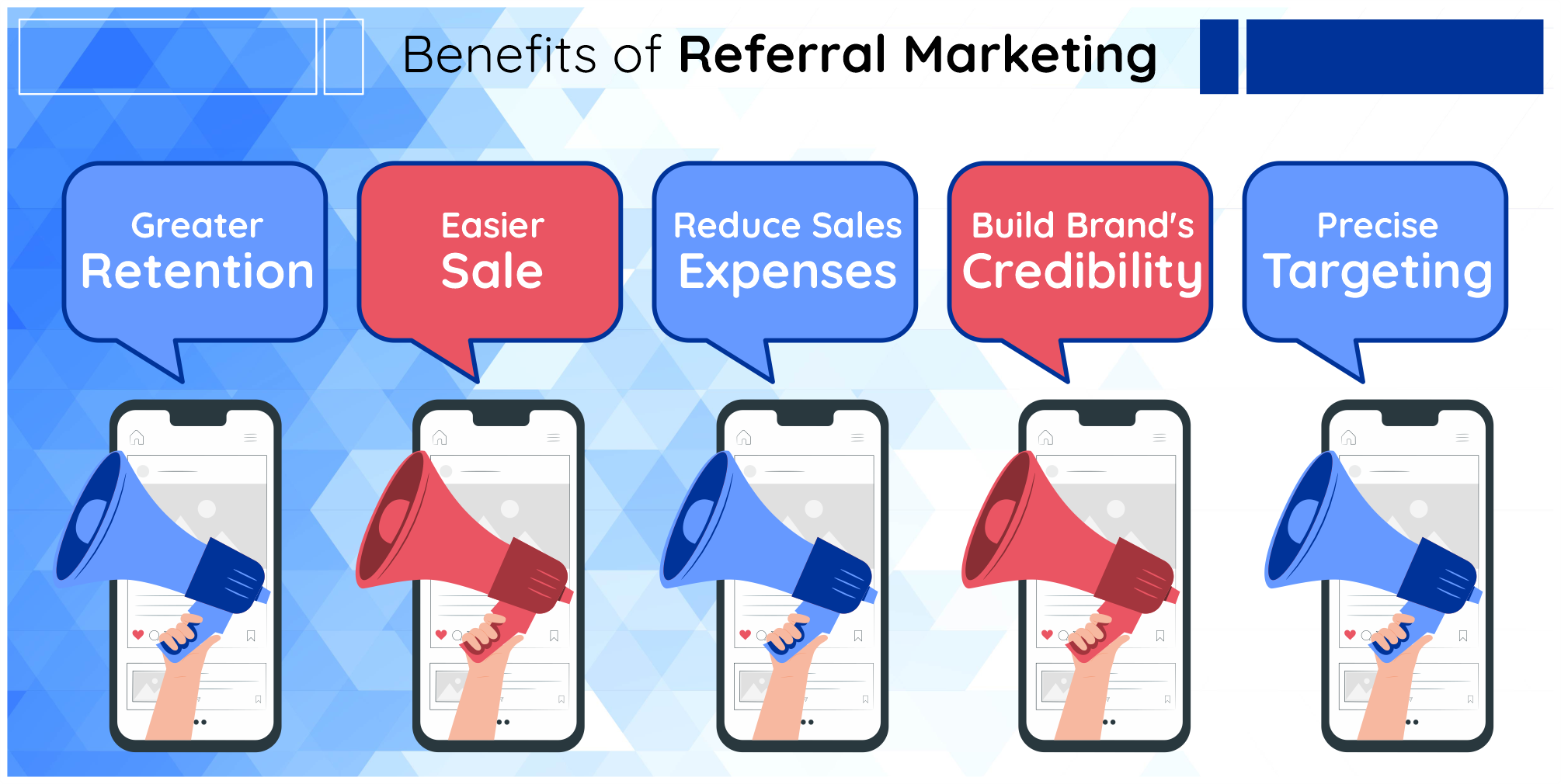Customer recommendations are a great way for a company to expand its clientele and bring on new, valuable customers. To increase market awareness, referral marketing builds on favorable word-of-mouth. In this post, we examine the advantages of referral marketing and discuss what it is.
What Is Referral Marketing?
Referral marketing is a type of advertising that expands a company’s clientele by leveraging personal recommendations and word-of-mouth advertising. Referral marketing initiatives are started and managed by marketers, as opposed to pure word-of-mouth, which develops naturally. By providing incentives, the marketer can influence the process and persuade current consumers to tell others about a good or service.
Referral marketing is one of the least expensive marketing techniques a company can utilise to expand its clientele.
Different Referral Programs To Support Your Business
1. Word-Of-Mouth Referral Programs:
One of the most established methods of product promotion is word-of-mouth. Marketing experts estimate that 92 percent of individuals are more likely to heed a friend’s recommendation than that of a salesperson.
However, word-of-mouth advertising is not that simple. People are too busy these days to talk about their experiences.
2. Referral Marketing Through Online Reviews:
Market participants are becoming more informed. And business needs clever techniques to deal with those clients. People no longer purchase goods directly from markets as they formerly did.
Nowadays, consumers want to read reviews before making a purchase. Companies must realise their value and put them into practise.
So, request feedback on your goods from your customers on their website. This referral programme is advantageous to your company both now and in the future.
3.Participate In Social Sharing And Recommendations:
Social sharing and recommendations are useful today while discussing social media.
Notable platforms that have a significant impact on the customer are Facebook and LinkedIn. Make an effort to see your name among the suggestions when someone on Facebook requests a referral.
Sharing information frequently can help you engage your audience. sharing informative stuff relevant to your brand. It aids the buyer in comprehending its advantages and qualities.
4. Recommendation Via Email:
Email referrals are becoming more and more common. It is at least as engaging as other social media platforms.
The most useful feature of the email referral program is it creates a personalized impression. The customer feels more privileged when companies send emails on their name.
The email referral program’s ability to generate a personalised impression is its most helpful feature. When businesses send emails in the customer’s name, they make them feel more important.
What Advantages Do Referral Marketing Offer?
Referral marketing has a number of advantages, including the following, despite the fact that it necessitates advertising efforts and incentives for consumers:
- You’ll choose a more targeted group of people.
Your current customers can recommend your product to people they know will benefit from it because they are familiar with both your product or service and the potential consumer. As a result, without investing in a costly advertising effort, you gain high-quality targeted consumers who require the advantages your product offers.
- You’ll attract valuable, dependable clients.
One of the main marketing objectives is to increase consumer trust in your brand. Building trust through personal recommendations is really important, and people trust them more than advertisements. Customers who have been recommended by a close friend or member of the family are more likely to be trustworthy and devoted, making them high-value clients.
- You can gauge client satisfaction.
A referral programme can be used as a technique to gauge client satisfaction. High customer satisfaction ratings are frequently a sign of successful, high-performing referral systems with lots of referrers. If you are having trouble getting recommendations, it’s likely that you need to solicit feedback and enhance your customer service.
- You’ll increase your market potential
Referral marketing initiatives have the ability to broaden your reach quickly. Customers will contact friends and relatives if given the correct incentive, whether in person or on social media, greatly expanding your reach. An influencer’s or celebrity’s unforced endorsement of your good or service gets you excellent press.
- You’ll raise brand recognition
A great technique for clients to learn more about your brand’s history is through referral marketing. Customers are picky about the brands they choose to use. Brands that are viewed as sincere and genuine are frequently favoured. When your customers talk about your company and share your story, it feels genuine, enhances your reputation, and has a big impact on customers.
- You’ll be able to identify devoted clients
Customers prefer to feel valued, and they may stop doing business with you if they feel that way. By giving consumers a more personalised contact experience and making them feel valued, referral marketing programmes enable you to identify, track, and reward your most devoted clients.
- Your conversion rate will rise.
There are various ways that referral marketing boosts conversion rates. When potential customers visit your store or sales website after hearing about you from a friend or family member, they may be more inclined to make a purchase because they already trust your brand. Referral programme engagement on social media offers social proof that enhances your brand’s reputation and persuades customers to make a purchase.
- You’ll boost client involvement
Referral marketing initiatives integrate with other forms of marketing, including emails, social media, and customer support. They motivate you to interact with your clients and improve engagement. Increased involvement increases your online presence and fosters the development of relationships. Through referral programmes, you may interact with and acknowledge customers on social media, which promotes more referrals.
- Your customer retention rate will increase.
Referral programmes offer insights into customers’ motives and expectations, assisting in the development and maintenance of long-term relationships with them. Customers that actively participate in referral programmes are therefore more likely to stick with your business. Customer retention is one of the top priorities because it often costs more to acquire and interact with new customers than it does to keep current ones.
Conclusion
Once your referral marketing strategies are in place, it’s crucial that you keep track of how well your campaign is doing. You can improve your strategy by using exploratory testing methods like A/B testing in production.
Keep in mind to abide by each of the aforementioned guiding principles, and use the more specific guidance to direct your choices. Your decisions will ultimately determine how well your referral campaign and rewards system perform.




